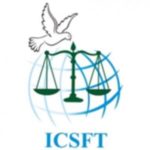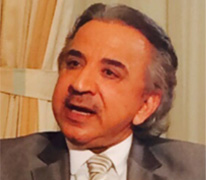The fifth and sixth day of the 35th session of the Human Rights Council took place on June 12 and 13, 2017 at the United Nations in Geneva. The Council started with an interactive dialogue with the Special Rapporteur on the independence of Judges and Lawyers, Mr Diego García-Sayán and the Special Rapporteur Ms Rashida Manjoo on violence against women, followed the report by the Special Rapporteur Mr David Kaye on the right to freedom of expression and opinion.
About the independence of judges and lawyers, the Special Rapporteur expressed its concerns. Judges, lawyers and judicial personnel are increasingly being subjected to threats; on the other hand the relationship between the weakening of judicial guarantees and the frequency of violations of human rights.
European countries such as France and Sweden, under the status of the European Union, exposed their concerns, on the issue of lawyers and judges under threat and others tempted by corruption, such as in the GCC countries.
Several NGO’s took the floor like the International Commission for Justice, it express it concern about several situations in some states like the GCC countries where the head of states controls the judiciary’s body. This has undermined the judiciary’s independence, already threatened by the mass dismissal of judges and the state of emergency. Lawyers and legal scholars, among others, are routinely dismissed or threatened by the authorities.
In regard to the discussion on violence against women, the Special Rapporteur Ms Rashida Manjoo focused on the intersectional nature of discrimination and violence against women, especially the relationship between socio-economic conditions, race, and historical and cultural contexts. She has particularly highlighted the interaction of interpersonal, institutional and structural violence, and she advocated a holistic approach to gender-based violence that centers on the interdependence and indivisibility of human rights.
The US urged Bahrain to respect Human Rights under international Standards. Nevertheless, President Trump’s recent visit to the kingdom has fueled the country’s human rights violations. In fact, the government’s crackdown on peaceful protesters in Duraz on May 23, 2017 is proof of such violations. Saudi Arabia expressed its opinion regarding women’s rights, raising concerns towards the fact that one in three women are sexually assaulted, usually by their husbands. However, According to British media, Syrian refugee girls, some of whom underage, are forced to married wealthy Saudis and are subject to rape.
Amnesty International took the floor to address policies and practices that criminalise or punish women and girls’ sexual and reproductive actions and decisions, or ban or restrict health information and services, serve as serious barriers to the enjoyment of their human rights, health, and wellbeing.
“Gender equality cannot be achieved without women and girls being empowered to make free choices about their sexuality and reproduction including through access to health services and information in line with human rights law and standards.”
The organisation is also concerned that these and other barriers disproportionately affect marginalized women and girls, and exacerbate existing inequalities. Addressing intersectional discrimination, and ensuring that the most marginalised groups are prioritized in the design and implementation of laws, policies and programmes guaranteeing the right to health, and all sexual and reproductive rights, is essential to delivering on the promise of the SDGs.
Women in Saudi are constantly oppressed and their most fundamental rights are denied. Women cannot drive, they cannot have a passport without the authorization of their husband, they cannot get married or leave their countries on their own decision. They have also to follow a dress code during the human rights council but have to wear appropriate clothes when it ends, according to the Sharia law. It comes to a surprise to see Saudi being elected as a member of the Commission on the Status of Women and active member of the Human Rights Council.
On the discussion with the special rapporteur David Kaye on freedom of expression and opinion he presented his report related to violations of the right to freedom of opinion and expression, discrimination, threats or use of violence, harassment, persecution or intimidation directed at persons seeking to exercise or to promote the exercise of the right to freedom of opinion and expression, including, as a matter of high priority, against journalists or other professionals in the field of information.
Russia and Iran declared that some states are using telecommunications tools for political and spying purposes and Russia urged the UN to work on a universal international treaty on States behavior regulation online. EU states called for an impartial judiciary and urged all countries to comply with international law and human rights standards.
The EU share the rapporteur’s concerns about the frequently occurring, State imposed, access restrictions that fail to meet international human rights standards and it wants to promote unhindered, uncensored and non-discriminatory access to online services, notably by the adoption in 2014 of the EU Human Rights Guidelines on Freedom of Expression. The right to freedom of expression should be protected online as well as offline.
ICSFT is concerned by worrying signals on the direct and indirect pressure of Government officials over media, and on the pressure on the public peaceful protest. Concerns that we can compare to the repressive campaign in Bahrain against media and human rights defenders. For example a female journalist has been shot dead in Bahrain in front of her young son, murdered by a member of the Gulf State's royal family, according to activists.
On Tuesday, Mr. Joaquín Alexander Maza Martelli, President of the Human Rights Council introduced the annual full day discussion on the human rights of women, giving the floor to Ms. Kate Gilmore, United Nations Deputy High Commissioner for Human Rights, who addressed the council urging states to take appropriate measures to promote women and women leadership. She called on stated to elaborate new values based on the entire respect of the women, and integrating the fact that men have to share all the duties and responsibilities with the women, she reminded that women rights are violated in a large part of the world and this is not acceptable.
According to Italy, the elimination of violence against women and girls and the promotion of women’s human rights must be a priority for all governments, nationally and internationally. Italy reaffirmed this statement also within the Security Council non-Permanent Member and as President of the G7 this year.
For the concluding remarks, to achieve the protection and the promotion of women's rights, states must adopt a holistic and intersectoral response to combat women discrimination and inequality. In this regard, states must provide education, access to economical, political and social rights to change the practices, to promote institutional changes and take concrete actions for the safety of women.
ICSFT condemns in the strongest terms women’s rights violations, and the oppression on freedom of expression. ICSFT stands for the independence of judges and lawyers and urges the GCC to adopt an independent judiciary to help citizens to exercise their universal and fundamental rights. ICSFT condemns the hypocrisy of the Gulf States regarding the total violation for the rights of women, the measures adopted to reduce the expression of their people and the pressure on judges to promote tyrannical and arbitrary regimes with condemnable and outdated practices.
Follow #ICSFT for more updates on #HRC35!
International Council Supporting Fair Trial and Human Rights



